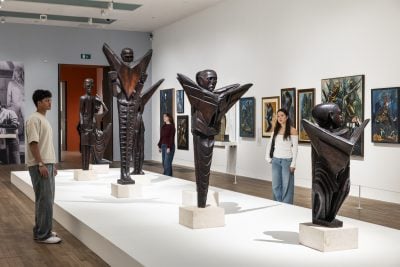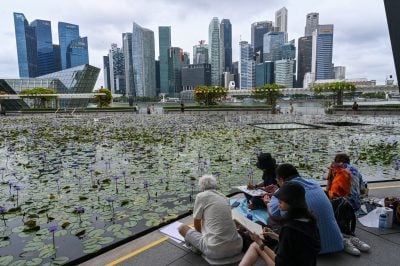With one of the oldest cinema industries in Africa – having screened its first film in 1896 – Egypt has an important role to play in leading African cinema forward and promoting collaboration.
In January, the 14th Luxor African Film Festival hosted 228 filmmakers and cinephiles from 19 African countries and held workshops in acting, directing, storytelling and technology for aspiring and professional filmmakers.
Platforms to enhance co-productions and cross-country projects, as well as connections with the diaspora, are pillars the organisers believe are essential to amplify the continent’s important stories.
“African cinema is on the rise. There might not be a developed cinema industry in all of the countries, but there are filmmakers,” Azza El Hosseiny, director of the Luxor African Film Festival tells African Business, speaking from her Cairo office.
“When we decided to start this festival 14 years ago, it was because there was nothing like it, and we wanted to establish communication among African countries,” says El-Hosseiny..
While film festivals started to spread across the continent at the end of the 1990s and beginning of the 2000s, gatherings focusing on the African film industry as a whole were for a long time restricted to events such as the Pan African Film and Television Festival of Ouagadougou, Burkina Faso, or the African Film Festival in Khouribga, Morocco.
“We have stories that deserve to be seen”
That is now changing.
“African countries might be growing economic-wise, but they are incredibly rich culturally speaking, they have different ways of communicating, diverse languages and meaningful stories,” says El Hosseiny, who has three decades of industry experience.
Such a creative environment has been inspiring industry experts who have been able to benefit from shared spaces at the Luxor African Film Festival. Egyptian director Essam Hayder, for instance, was just starting his career when he participated in the festival’s 2015 edition.
A workshop hosted by the legendary Ethiopian director Haile Gerima changed his life.
“That experience was the first for me to meet filmmakers from different African countries, and it was incredible to see how passionate they were about their projects,” Hayder tells African Business.
“We need more initiatives focused on African cinema that help our films reach the entire world, because we have stories that deserve to be seen.”
The films that received a prize in this year’s edition paid tribute to some under-represented topics unique to Africa’s realities. Morocco’s Chikha talks about the difficult choices and stereotypes suffered by women singers and dancers of the traditional Aïta genre. Nigeria’s The Man Died tells the story of the political imprisonment of writer and activist Wole Soyinka. Senegal’s Demba delves into the experience of grief and ageing in northern Senegal, providing a picture of how people in different places deal with shared human experiences.
And Algeria’s chronicles of anti-colonial figure Frantz Fanon’s years of service in a psychiatric hospital in Algiers in Frantz Fanon provide a unique account of Fanon’s pioneer therapy to tackle the psychological impact of racism during the journey towards emancipation.
A shared struggle
“The narratives that have been shared about us and the space that we have been given historically as Egyptians, Arabs and as Africans is somehow comparable and a shared struggle that should make us unite and and try to work together,” says Hayat Aljowaily, Egyptian filmmaker and head of the Emerge programme at the El Gouna Film Festival.
Leading a programme for aspiring filmmakers in Egypt and the region that she hopes to extend across Africa, Aljowaily believes in the potential of young African filmmakers.
“We are such a youthful continent, which means that there is so much talent, so many untapped sources of creativity and narratives that have not been given the attention that they need just yet.”
Aljowaily, as well as Essam, has also participated in other continent-wide initiatives like the Durban FilmArt Institute’s programmes in South Africa’s dynamic and prestigious cinema scene.
“The most inspiring is their future mentors programme,” says Aljowaily, “which is meant to form the future cinema mentors of the continent so that they can take the lead in terms of shaping the next generation of unapologetic African voices.”
Time for pan-African collaboration
Although initiatives to unlock the potential of African cinema are on the rise, filmmakers believe more has to be done. In particular, Egyptian filmmakers believe it is time to expand this field of collaboration beyond North Africa.
Egypt has enhanced its economic ties with sub-Saharan Africa in the last decade through investments in African projects and its participation and holding of regional meetings. This cooperation ought to spill over into films.
“In Egypt we need more education about our African identity and our own continent,” says Essam, who thinks that such spaces in Egypt are a good opportunity to learn about a part of the country’s identity that is often forgotten.
“We need many more platforms like Luxor’s African Film Festival or Durban’s FilmArt Institute to raise the industry and help the continent produce a cultural and artistic output that we can take to the international stage and state that we are here; not for the sake of pleasing you or get your approval, but because we have our own films and we want to talk about them in our way.”
Want to continue reading? Subscribe today.
You've read all your free articles for this month! Subscribe now to enjoy full access to our content.
Digital Monthly
£8.00 / month
Receive full unlimited access to our articles, opinions, podcasts and more.
Digital Yearly
£70.00 / year
Our best value offer - save £26 and gain access to all of our digital content for an entire year!
 Sign in with Google
Sign in with Google 



